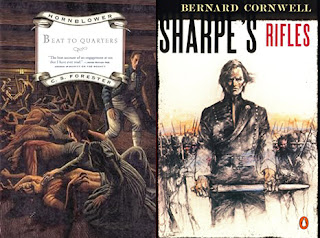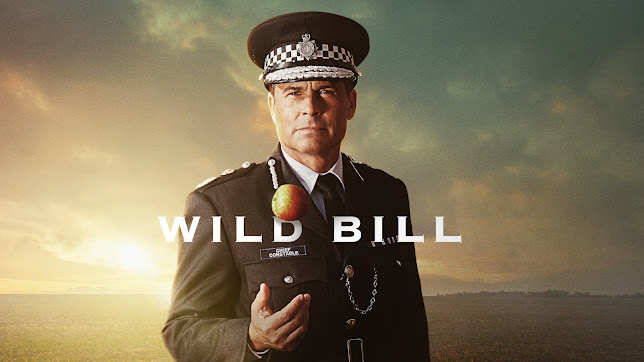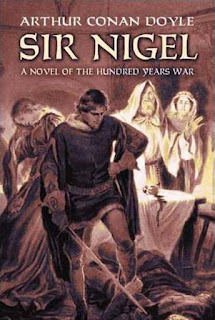By Sea or By Land - Forrester vs. Cornwell
My father had a tremendous love of C.S. Forester's Horatio Hornblower series. With regularity he would press me about reading them. After all, I was born under the sign of water, and all things sail fascinate me. Of course the fact that my father attended the Naval Academy and held a Master Yawl Handler's license may have had something to do with that. With that said, at the time, my reading interests where elsewhere, so I steered clear of them for quite a bit.
Dad's love for those stories was such that each year, when the old Gregory Peck, Virginia Mayo "Horatio Hornblower" movie would show on the television, he and I would have to sit down and watch it. The movie is based off of Forester's book "Beat to Quarters" in the series. It has become one of those movies I like to watch when I am feeling nostalgic, and perhaps missing dad a bit. As the love of the film has made a viewing routine in our household, my wife has become a Hornblower fan as well. Her movie preference is British historical TV series starring Ioan Gruffud. It aired on A&E from 1998 to 2001. Don't tell my wife I said this, but it might be a tad better than the 1951 version. Needless to say, we own both series on DVD. After watching them a few years back, I decided to take the plunge and the books. I was not disappointed.
The series begins with a 17 year old Hornblower serving as a Midshipman in His Majesty's Royal Navy in the late 1700's. The French Army, under command of General Napoleon, is flexing it's muscle in Europe and around the Mediterranean. Beginning with "Mr. Midshipman Hornblower," Forester walks us through his protagonist's successes, failures, and impasses as he moves through the ranks from Midshipman to Admiral. The timeline of series carries the us well into the 1800's, concluding with Hornblower serving in the West Indies after Napoleon's final defeat.
What sounds like a series of books for those who would seek the adventures of the sea should pleasantly surprise readers who find the summary above not super intriguing. I think that's what kept me from reading these for years. The idea of a series of stories about a man on a ship just didn't seem exciting. I understood the battle element could provide a bit of a thrill, but how often could those take place? The rest of the time would be encompassed moving around on a vessel half the length of an American football field. Not fun. I could not have been more mistaken.
Throughout the series we follow Hornblower the man as he experiences all aspects of life, from his military experiences, to the affairs of the heart. I don't want to disclose too much, but Hornblower is definitely a man, a man with character flaws he must rise above, and a man who loves with passion. Forester weaves these moments into the series in a way that will have you experiencing the main character's emotions, and perhaps some of the complementary player's emotions as well. The characters will make decisions, or do things that will delight you. They will also make choices or perform actions that will infuriate you.
The most fascinating aspect of Forester's work, in my humble opinion, is the meticulous research he put into the life of a sailor serving in His Majesty's Royal Navy. His descriptions of life at sea transport the reader right into the moment. There are moments in the series that take place off the east coast of France in the dead of winter, or in the Baltic Sea around the same time of year that made me shiver... and I live in southwest Florida. If you cannot tell, I highly recommend this series.
Now, if you are of a mind to read something similar, yet not the same, I suggest you read Bernard Cornwell's "Sharpes" series. An admitted fan of C.S. Forester himself, it wouldn't be a stretch to say Cornwell wrote Horatio Hornblower on land. The series takes place in the same timeframe as Hornblower. It features a rising star in the British Army's 95th Rifles, Richard Sharpe. The series begins, well, the first book authored in the series, begins with the British retreat through Spain into Portugal before Wellington takes over command and begins to push back. It ends, well, Cornwell is still publishing books in the series, so there's a lot of material to get lost in, but Sharpe's Assassin, published in 2021, takes place in occupied Paris after Napoleon's defeat at Waterloo.
Sharpe's story is similar to Hornblower's in that he doesn't come from the aristocracy, so his journey through the ranks is not an easy one, not that a journey through any military system is. He acts with honor, he fears, he loves, and not just loves, but loves with passion and insecurity. He has triumphs, failures, setbacks, and impasses. Sounds like a repeat of Hornblower, but it isn't. Unlike Hornblower, Sharpe's origins are harsh. His obstacles are greater. His enemies are not just enemies of the British Empire, but enemies who wear the uniform of the Crown. His experiences are visceral and graphic.
While Forester did weave subjects into the Hornblower series that may have seemed a bit taboo at the time of publication, Cornwell doesn't hesitate to take on what I would call the depravity of man. I would say he, Cornwell, has applied the same amount of R&D to the time period, and taken it a step further. This is what separates the two series in my opinion. Cornwell brings you face to face with the the humanity, or lack thereof, of the time period. My wife commented how graphic Cornwell's descriptions are, and not in a cheap and tawdry fashion, but appropriate for the moment or scene. Hence the visceral and graphic comment above.
Cornwell also writes with a more film like structure, he knows how to carry us into action, describe it with a pace that will leave your heart racing. He knows how to bring you to as rest, but keeping the tension of the various elements of the story at the fore. There were moments in these stories that I had to force myself not to skip ahead because I wanted to know the outcome. I hate to write this part, but my wife has put her reading on hold because the work makes her too anxious. It's a roller coaster ride, and a darned good one.
Another pleasant aspect to this series is Cornwell occasionally will take us back to Sharpe's service in India, expounding on experiences only described in prior books. The incident that earned Sharpe his commission for instance, so we get a truly well rounded understanding of the man at the center of the story. Cornwell also does a really wonderful job of building the relationships Sharpe has with his comrades, those he can trust, and those he doesn't. You will love and hate characters in this series. There are a few characters you will feel this way about in Hornblower, but the narrative centers around him. In the Sharpe's series, you are going to have the same friends, and enemies, as Sharpe. You might even fall in love with one of the heroines, and maybe have your heart broken.
All in all, if you want exciting drama on the high seas, or on land, read the Horatio Hornblower and/or Sharpe's series. Honestly, I say read them both.
Links below to are for the books shown via thriftbooks.com:
Beat to Quarters via Thriftbooks.com
Sharpe's Rifles via Thriftbooks.com




Comments